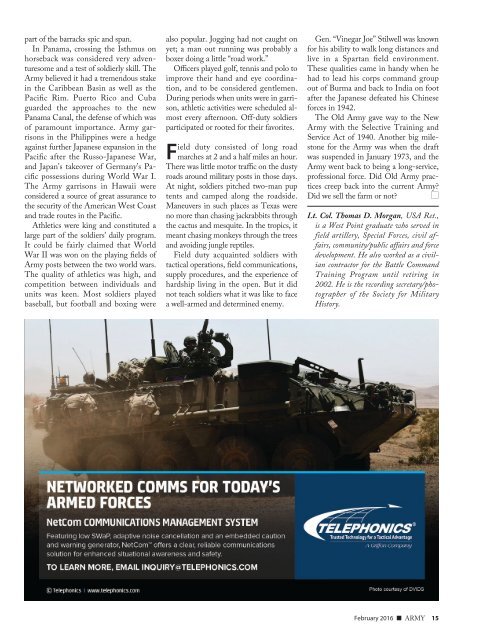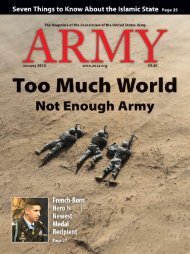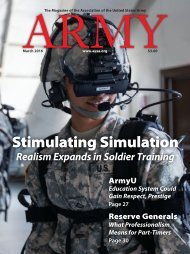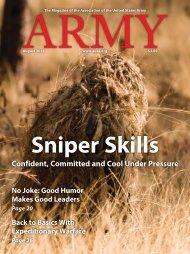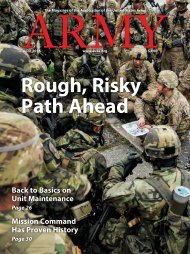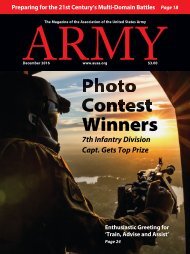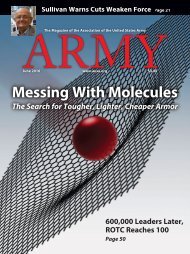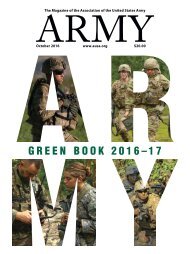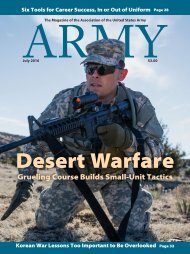Army - Kicking Tires On Jltv
Create successful ePaper yourself
Turn your PDF publications into a flip-book with our unique Google optimized e-Paper software.
part of the barracks spic and span.<br />
In Panama, crossing the Isthmus on<br />
horseback was considered very adventuresome<br />
and a test of soldierly skill. The<br />
<strong>Army</strong> believed it had a tremendous stake<br />
in the Caribbean Basin as well as the<br />
Pacific Rim. Puerto Rico and Cuba<br />
guarded the approaches to the new<br />
Panama Canal, the defense of which was<br />
of paramount importance. <strong>Army</strong> garrisons<br />
in the Philippines were a hedge<br />
against further Japanese expansion in the<br />
Pacific after the Russo-Japanese War,<br />
and Japan’s takeover of Germany’s Pacific<br />
possessions during World War I.<br />
The <strong>Army</strong> garrisons in Hawaii were<br />
considered a source of great assurance to<br />
the security of the American West Coast<br />
and trade routes in the Pacific.<br />
Athletics were king and constituted a<br />
large part of the soldiers’ daily program.<br />
It could be fairly claimed that World<br />
War II was won on the playing fields of<br />
<strong>Army</strong> posts between the two world wars.<br />
The quality of athletics was high, and<br />
competition between individuals and<br />
units was keen. Most soldiers played<br />
baseball, but football and boxing were<br />
also popular. Jogging had not caught on<br />
yet; a man out running was probably a<br />
boxer doing a little “road work.”<br />
Officers played golf, tennis and polo to<br />
improve their hand and eye coordination,<br />
and to be considered gentlemen.<br />
During periods when units were in garrison,<br />
athletic activities were scheduled almost<br />
every afternoon. Off-duty soldiers<br />
participated or rooted for their favorites.<br />
Field duty consisted of long road<br />
marches at 2 and a half miles an hour.<br />
There was little motor traffic on the dusty<br />
roads around military posts in those days.<br />
At night, soldiers pitched two-man pup<br />
tents and camped along the roadside.<br />
Maneuvers in such places as Texas were<br />
no more than chasing jackrabbits through<br />
the cactus and mesquite. In the tropics, it<br />
meant chasing monkeys through the trees<br />
and avoiding jungle reptiles.<br />
Field duty acquainted soldiers with<br />
tactical operations, field communications,<br />
supply procedures, and the experience of<br />
hardship living in the open. But it did<br />
not teach soldiers what it was like to face<br />
a well-armed and determined enemy.<br />
Gen. “Vinegar Joe” Stilwell was known<br />
for his ability to walk long distances and<br />
live in a Spartan field environment.<br />
These qualities came in handy when he<br />
had to lead his corps command group<br />
out of Burma and back to India on foot<br />
after the Japanese defeated his Chinese<br />
forces in 1942.<br />
The Old <strong>Army</strong> gave way to the New<br />
<strong>Army</strong> with the Selective Training and<br />
Service Act of 1940. Another big milestone<br />
for the <strong>Army</strong> was when the draft<br />
was suspended in January 1973, and the<br />
<strong>Army</strong> went back to being a long-service,<br />
professional force. Did Old <strong>Army</strong> practices<br />
creep back into the current <strong>Army</strong>?<br />
Did we sell the farm or not? ■<br />
Lt. Col. Thomas D. Morgan, USA Ret.,<br />
is a West Point graduate who served in<br />
field artillery, Special Forces, civil affairs,<br />
community/public affairs and force<br />
development. He also worked as a civilian<br />
contractor for the Battle Command<br />
Training Program until retiring in<br />
2002. He is the recording secretary/photographer<br />
of the Society for Military<br />
History.<br />
February 2016 ■ ARMY 15


